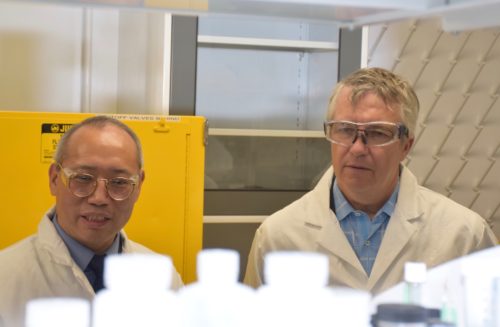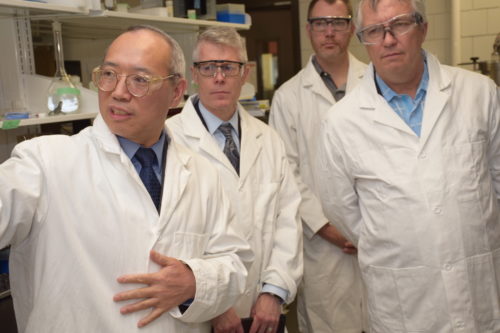
The University of Guelph has received a $4.7 million investment from the federal government through a new Canada Research Chair (CRC) and the renewal of three others.
U of G now has 26 chairholders in a range of disciplines across campus. The appointment and renewals were announced by the federal government this week.
“Our researchers are dedicated to improving life on our planet, and the Canada Research Chair program definitely enhances our ability to put research into action for the betterment of the world,” said Malcolm Campbell, vice-president (research).
“We have vast knowledge in a diverse range of areas, knowledge that can be brought to bear on the most pressing needs and challenges of our time. We are excited to increase our capacity as a top comprehensive university in Canada, and we are grateful for the CRC program’s outstanding support.”
Named as a new Tier I CRC in electrochemistry and nanoscience, chemistry professor Aicheng Chen studies electrochemical interfaces and is a leader in studying the application of nanoscience to energy, environment, food and medicine.
MP Lloyd Longfield toured Chen’s lab Wednesday to recognize U of G’s new and renewed CRCs. “Supporting these research chairs highlights the University of Guelph’s commitment to improving life and the federal government’s commitment to science based policy and the use of data in decision making,” Longfield said. “Together we are improving the lives of Canadians through important research happening right here in Guelph.”

Canada Research Chairs are funded by the Natural Sciences and Engineering Research Council (NSERC), the Social Sciences and Humanities Research Council and the Canadian Institutes of Health Research.
“Our government is committed to promoting equity and diversity within research and to supporting the next generation of research leaders,” said Kirsty Duncan, minister of science. “These prestigious Canada Research Chairs are improving the lives of Canadians and pushing the boundaries of human knowledge, helping ensure a bright future for Canada.”
Chen will receive $1.4 million over seven years from the CRC program. He aims to create innovative green technologies for wastewater treatment, energy conversion and storage, and to foster sustainable development of natural resources, particularly clean drinking water.
“Supporting these research chairs highlights the University of Guelph’s commitment to improving life and the federal government’s commitment to science based policy and the use of data in decision making,” said Guelph MP Lloyd Longfield. “Together we are improving the lives of Canadians through important research happening right here in Guelph.”
Besides Canada Research Chairs, U of G scholars hold more than 30 endowed and externally funded research chairs; three faculty members hold Industrial Research Chairs funded by NSERC.
This week’s CRC funding announcement included a new investment of $210 million over the next five years across Canada, adding 285 new chairs. Funding for the new and renewed U of G chairs amounts to $4.7 million.
CRCs have been renewed for three U of G professors, as follows:

Barbara Morrongiello, Department of Psychology, Tier 1 CRC in child and youth injury prevention, worth $200,000 a year for seven years. Morrongiello studies interactions of risk factors to prevent unintentional injuries in children.

Alejandro Marangoni, Department of Food Science, Tier 1 CRC in food, health and aging, worth $200,000 a year for seven years: He looks at replacing trans and saturated fats with healthier alternatives to improve food quality and physiological response.

Sharada Srinivasan, Department of Sociology and Anthropology, Tier 2 chair in gender, justice and development, worth $100,000 a year for five years. She studies the inter-generational dynamics of daughter discrimination, particularly in India, by bringing together aspects of gender, generation, farming, anthropology and development.